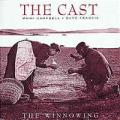|
The Cast's debut album which has received generous critical acclaim.
"Mairi's powerful and moving voice, combined with Dave's eclectic and sympathetic guitar-playing, is a combination that lends new twists to familiar songs and results in refreshing original material."
|
|
1
|
Auld Lang Syne (Robert Burns)
We feel that this is a song that looks forward as well as back. The melody we use here is Burns' original setting for his universally known words - the better known melody is, incidentally, claimed by both the Chinese and Japanese as one of theirs.
|
|
|
2
|
Scots Callan o' Bonnie Dundee
It's usual in the tradition for young women to lament their rashness in falling for passing soldiers. But the woman in this song seems content with her bairn, and her fate. This version of the song has a last verse added by Burns and is taken from Nigel Gatherer's Songs and Ballads of Dundee.
|
|
|
3
|
Archie Campbell (Campbell) * Marjorie Campbell (Campbell) * Miss Lyall's Strathspey * Miss Lyall's Reel * The St Kilda Wedding
Archie Campbell and Marjorie Campbell are two of the people without whom The Cast would have been impossible or very different. Miss Lyall was an 18th century belle who obviously made a fiddler's strings tremble to good effect. 1993 was the year of the first wedding on St Kilda since 1926 (the island was evacuated in 1930) and we'd like to dedicate the tune to our friends Alasdair and Donna, who were the main participants!
|
|
|
4
|
The Step-Dancing Song (Campbell/Francis)
We put this song together after Mairi returned to Edinburgh after a step-dancing course in Cape Breton, Nova Scotia. The lady featured in the last verse is real and did not share Mairi's enthusiasm for this hitherto neglected part of our culture. The tunes which put in an appearance are King George IV and The New King's Reel, both great favourites with Cape Breton fiddlers.
|
|
|
5
|
Flowers o' the Forest (Lady Nairne)
Lady Nairne's lyric grieves for the 12,000 Scots who died in 1513 at the Battle of Flodden, a battle prompted more by obligations to continental alliances than traditional enmity with England. For a small country like Scotland the cultural and economic consequences of such a loss were incalculable. The emotions described in the song are universal and resonate throughout our own century.
|
| |
6
|
Green Grow the Rashes (Robert Burns)
Burns wrote this on a British Council sponsored trip to Rio de Janeiro where he became a kenspeckle figure in the bodegas and cantinas of that city. The song itself became so popular among the citizens that people would stop in the street and shout to the poet as he passed: "Hey, gringo! gringo!". Another mystery solved. |
| |
7
|
Bright Fields of England (Steve Rothero) * Crossing to Ireland
The first song, which we had thought was traditional, was written a few years back by Steve Rothero for a production of Lark Rise to Candleford. Crossing to Ireland is from the Simon Fraser collection of fiddle tunes. |
| |
8
|
Kilkelly (Peter and Steve Jones)
Peter Jones, American of Irish descent, made this song from letters which had passed down his family. The writer in the first four verses is based on his own great-great grandfather. |
| |
9
|
Ye Banks and Braes (Robert Burns)
A famously inspired match of tunes and lyrics by Burns who, as a fiddler himself, would have known the tune as The Royal Caledonian Hunt's Delight. |
| |
10
|
The Royal Visit (William Lillie)
This drama of domestic discord and concord is from the Greig-Duncan collection of songs current in North East Scotland in the early 1900s. The Royal Visit by George IV in 1822 was a sensational affair, the first to Scotland by a monarch for 170 years. Huge crowds saw the appearance of the king in short kilt and pink tights. The pink tights never caught on but the tartan accessories did. No music is given in Greig-Duncan, so we put the country dance tune Kiss Me Quick, My Mither's Coming to the words. |
| |
|
All compositions arranged by Campbell/Francis, traditional unless credited.
Produced by Jack Evans. |
|
